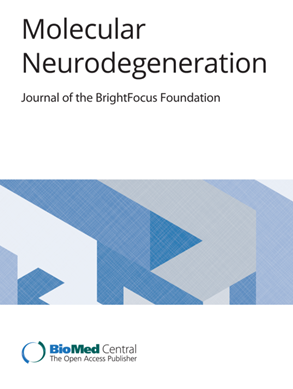Regional desynchronization of microglial activity is associated with cognitive decline in Alzheimer’s disease
IF 14.9
1区 医学
Q1 NEUROSCIENCES
引用次数: 0
Abstract
Microglial activation is one hallmark of Alzheimer disease (AD) neuropathology but the impact of the regional interplay of microglia cells in the brain is poorly understood. We hypothesized that microglial activation is regionally synchronized in the healthy brain but experiences regional desynchronization with ongoing neurodegenerative disease. We addressed the existence of a microglia connectome and investigated microglial desynchronization as an AD biomarker. To validate the concept, we performed microglia depletion in mice to test whether interregional correlation coefficients (ICCs) of 18 kDa translocator protein (TSPO)-PET change when microglia are cleared. Next, we evaluated the influence of dysfunctional microglia and AD pathophysiology on TSPO-PET ICCs in the mouse brain, followed by translation to a human AD-continuum dataset. We correlated a personalized microglia desynchronization index with cognitive performance. Finally, we performed single-cell radiotracing (scRadiotracing) in mice to ensure the microglial source of the measured desynchronization. Microglia-depleted mice showed a strong ICC reduction in all brain compartments, indicating microglia-specific desynchronization. AD mouse models demonstrated significant reductions of microglial synchronicity, associated with increasing variability of cellular radiotracer uptake in pathologically altered brain regions. Humans within the AD-continuum indicated a stage-depended reduction of microglia synchronicity associated with cognitive decline. scRadiotracing in mice showed that the increased TSPO signal was attributed to microglia. Using TSPO-PET imaging of mice with depleted microglia and scRadiotracing in an amyloid model, we provide first evidence that a microglia connectome can be assessed in the mouse brain. Microglia synchronicity is closely associated with cognitive decline in AD and could serve as an independent personalized biomarker for disease progression.微胶质细胞活动的区域非同步化与阿尔茨海默病认知能力下降有关
小胶质细胞活化是阿尔茨海默病(AD)神经病理学的标志之一,但人们对脑内小胶质细胞区域性相互作用的影响知之甚少。我们假设,健康大脑中的小胶质细胞活化是区域同步的,但在持续的神经退行性疾病中会出现区域不同步。我们探讨了小胶质细胞连接组的存在,并将小胶质细胞非同步化作为一种老年痴呆症生物标志物进行了研究。为了验证这一概念,我们对小鼠进行了小胶质细胞耗竭试验,以检验当小胶质细胞被清除时,18 kDa 转运体蛋白(TSPO)-PET 的区域间相关系数(ICCs)是否会发生变化。接下来,我们评估了小胶质细胞功能障碍和 AD 病理生理学对小鼠大脑中 TSPO-PET ICCs 的影响,然后将其转化为人类 AD 连续数据集。我们将个性化的小胶质细胞失同步指数与认知表现联系起来。最后,我们在小鼠体内进行了单细胞放射追踪(scRadiotracing),以确保所测得的去同步化是由小胶质细胞引起的。小胶质细胞缺失的小鼠在所有脑区都显示出强烈的 ICC 下降,这表明小胶质细胞特异性的非同步化。注意力缺失症小鼠模型显示小胶质细胞同步性明显降低,这与病理改变的大脑区域细胞放射性示踪剂摄取的变异性增加有关。小鼠的 scRadiotracing 显示,TSPO 信号的增加归因于小胶质细胞。通过在淀粉样蛋白模型中对小胶质细胞耗竭的小鼠进行 TSPO-PET 成像和 scRadiotracing,我们首次提供了可以在小鼠大脑中评估小胶质细胞连接组的证据。小胶质细胞的同步性与注意力缺失症的认知能力下降密切相关,可以作为疾病进展的独立个性化生物标记物。
本文章由计算机程序翻译,如有差异,请以英文原文为准。
求助全文
约1分钟内获得全文
求助全文
来源期刊

Molecular Neurodegeneration
医学-神经科学
CiteScore
23.00
自引率
4.60%
发文量
78
审稿时长
6-12 weeks
期刊介绍:
Molecular Neurodegeneration, an open-access, peer-reviewed journal, comprehensively covers neurodegeneration research at the molecular and cellular levels.
Neurodegenerative diseases, such as Alzheimer's, Parkinson's, Huntington's, and prion diseases, fall under its purview. These disorders, often linked to advanced aging and characterized by varying degrees of dementia, pose a significant public health concern with the growing aging population. Recent strides in understanding the molecular and cellular mechanisms of these neurodegenerative disorders offer valuable insights into their pathogenesis.
 求助内容:
求助内容: 应助结果提醒方式:
应助结果提醒方式:


